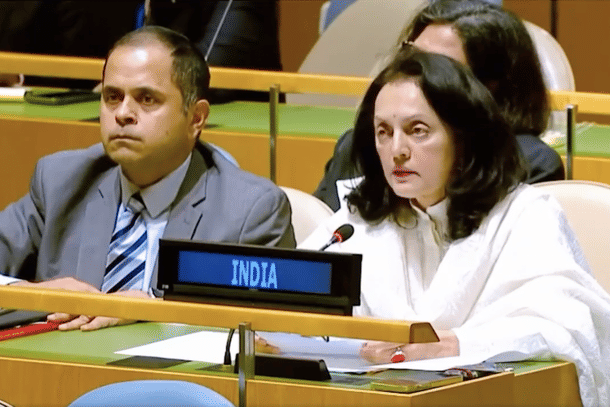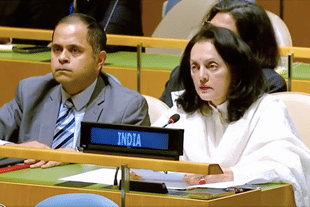News Brief
'Attack On Temples, Glorification Of Breaking Idols': India Calls For Recognition Of 'Religiophobia' Beyond Abrahamic Faiths At UN
Kuldeep Negi
Mar 16, 2024, 12:25 PM | Updated 12:25 PM IST
Save & read from anywhere!
Bookmark stories for easy access on any device or the Swarajya app.


India on Friday (15 March) abstained on a United Nations draft resolution, introduced by Pakistan and supported by China, on Islamophobia, and emphasised on the need to recognise discrimination and violence against various religions, not just Islam.
The resolution, titled "Measures to combat Islamophobia," was passed with 115 countries in favour, none opposed, and 44 abstentions, including India, Brazil, France, Germany, Italy, Ukraine and the UK.
India's Permanent Representative to the UN Ambassador Ruchira Kamboj voiced condemnation of all acts motivated by anti-Semitism, Christianophobia and Islamophobia but asserted that it is crucial to acknowledge that such phobias extend beyond Abrahamic religions.
"Clear evidence shows that over decades, followers of non-Abrahamic religions have also been affected by religiophobia. This has led to the emergence of contemporary forms of religiophobia, particularly anti-Hindu, anti-Buddhist and anti-Sikh sentiments," she said, in an explanation of India's position on the resolution
She argued for a more inclusive approach to combat religious discrimination, cautioning against the potential division of the UN into religious factions.
"It is crucial for the UN to maintain its stance above such religious concerns, which have the potential to fragment us rather than unite us under the banner of peace and harmony, embracing the world as one global family," Kamboj said.
India called on all member states to consider the broader scope of religious discrimination that persists globally.
"While the issue of Islamophobia is undoubtedly significant, we must acknowledge that other religions are also facing discrimination and violence. Allocating resources solely to combat Islamophobia, while neglecting similar challenges faced by other faiths, might inadvertently perpetuate a sense of exclusion and inequality," she said.
Kamboj told the UN General Assembly that "it is crucial to recognise" that Hinduism, with over 1.2 billion followers, Buddhism with more than 535 million and Sikhism with over 30 million followers worldwide, are all subject to religiophobia.
"The destruction of the Bamiyan Buddhas, violations of gurudwara premises, massacres of Sikh pilgrims in gurudwaras, attacks on temples, and the glorification of breaking idols in temples all contribute to the rise of contemporary forms of religiophobia against non-Abrahamic religions," she said, Economic Times reported.
Kamboj underlined that India stands against all forms of religiophobia, be it antisemitism, Christianophobia, or Islamophobia, as "we stand against all anti-Hindu, anti-Buddhist, and anti-Sikh sentiments."
The resolution condemned the incitement to discrimination, hostility or violence against Muslims as manifested in the increasing number of incidents of desecration of their holy book, attacks on mosques, sites and shrines and other acts of religious intolerance, negative stereotyping, hatred and violence against Muslims.
It also requested UN Secretary-General Antonio Guterres to appoint a United Nations Special Envoy to combat Islamophobia.
India said it "in principle" is opposed to the creation of the post of a Special Envoy on the basis of a single religion, she said.
Kamboj raised concerns about the proposal to appoint a UN Special Envoy for Islamophobia, suggesting that resources could be better utilized in a more comprehensive effort to tackle religious discrimination.
Kuldeep is Senior Editor (Newsroom) at Swarajya. He tweets at @kaydnegi.





